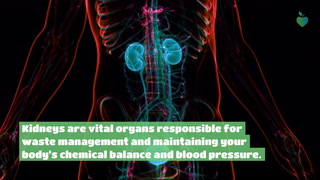How to Keep Your Kidneys Healthy When You Have Diabetes

The kidneys are vital organs responsible for waste management, which is crucial for maintaining your body’s chemical balance and blood pressure. If you don’t take care of your kidneys, you risk a slew of health problems, some of which could cause the organs to shut down altogether.
Diabetic nephropathy, also called diabetic kidney disease, is a serious kidney-related complication of type 1 and type 2 diabetes. About 40 percent of people with diabetes will likely develop a form of chronic kidney disease (CKD), such as diabetic kidney disease. Early on, diabetic kidney disease has no symptoms.
Lifestyle habits that can also help include regular exercise; checking your blood glucose to ensure your blood sugar is in a healthy range; timely screening for kidney disease; and not smoking.
Here are some additional steps you can take on your own to protect your kidneys when you have diabetes.
5 Ways to Lower Your Risk of Diabetic Kidney Disease

Next up video playing in 10 seconds
Eat Fruits and Vegetables for Healthy Kidneys
Additional fruits and vegetables have specifically helped patients with chronic kidney disease, who are susceptible to metabolic acidosis. These patients are usually treated with bicarbonate and other alkali supplements. But in this study, researchers wanted to see what happened if participants simply ate more fruits and vegetables — both of which are good, natural sources of alkali.
The researchers randomly treated 76 patients who had stage 4 chronic kidney disease with either a diet including fruits and vegetables or oral sodium bicarbonate. Both groups showed similar kidney function, decreased rates of metabolic acidosis, and lowered rates of kidney injury. The researchers argued in their paper that these interventions may improve kidney health in people diagnosed with kidney disease.
Be sure to talk to your doctor about the right diet for you. Some patients with kidney disease may need to limit their intake of potassium, which can be higher in certain fruits and vegetables.
Eat Foods With Omega-3s to Make Dialysis Work Better
The researchers observed in their paper that, during the first year of hemodialysis, those participants who had higher levels of omega-3 fatty acids — which are found in fatty fish, like salmon and tuna, as well as flaxseed and walnuts — had a lower risk of sudden cardiac death. The study offered some clues for new treatments against sudden cardiac death in people with kidney disease who are undergoing dialysis.
Cut Back on Salt to Protect the Kidneys
Keep Kidneys Healthy With Regular Exercise
Researchers found that aerobic training reduced levels of inflammatory chemicals in the blood, enhanced functional performance, and improved cardiorespiratory fitness. Combined training, which incorporates both aerobic and resistance training, was found to “robustly improve” depression and anxiety symptoms, functional performance, and cardiorespiratory fitness. Finally, home-based, respiratory, and resistance training showed “strong evidence” of improved functional performance. While the review’s authors note that one form of exercise was not shown to be better than another, they conclude that exercise is a “potent nonpharmacological tool” to improve outcomes for people with CKD.
The Takeaway
- The kidneys are responsible for waste management in the body, which is crucial for maintaining your body’s chemical balance and blood pressure.
- Diabetes is the number one cause of chronic kidney disease (CKD), and 1 in 3 people who have diabetes also have CKD.
- Healthy blood sugar and blood pressure levels are necessary to prevent CKD. Work with your doctor to make lifestyle modifications and find an effective medication regimen.
Resources We Trust
- Mayo Clinic: Diabetic Nephropathy (Kidney Disease)
- American Diabetes Association: Chronic Kidney Disease and Risk Management: Standards of Care in Diabetes — 2025
- National Kidney Foundation: Diabetes and Kidney Disease (Stages 1–4)
- UpToDate: Treatment of Diabetic Kidney Disease
- Mount Sinai: Diabetes and Kidney Disease
- Diabetic Kidney Disease. National Institute of Diabetes and Digestive and Kidney Diseases. February 2017.
- Chronic Kidney Disease. Centers for Disease Control and Prevention. May 15, 2024.
- Diabetes-Related Nephropathy. Cleveland Clinic. September 15, 2022.
- Breaking Down the Benefits and Costs of Kidney-Protective Diabetes Medications. National Kidney Foundation. November 20, 2024.
- U.S. FDA Approves Jardiance® for the Treatment of Adults with Chronic Kidney Disease. Eli Lilly. September 22, 2023.
- FDA Approves Ozempic® (Semaglutide) as the Only GLP-1 RA to Reduce the Risk of Worsening Kidney Disease and Cardiovascular Death in Adults with Type 2 Diabetes and Chronic Kidney Disease. Novo Nordisk. January 28, 2025.
- Goraya N et al. A Comparison of Treating Metabolic Acidosis in CKD Stage 4 Hypertensive Kidney Disease with Fruits and Vegetables or Sodium Bicarbonate. Clinical Journal of the American Society of Nephrology. February 7, 2013.
- Metabolic Acidosis. Cleveland Clinic. November 23, 2022.
- Friedman AN et al. Inverse Relationship Between Long-Chain N-3 Fatty Acids and Risk of Sudden Cardiac Death in Patients Starting Hemodialysis. Kidney International. February 6, 2013.
- Diabetes and Heart Disease. Johns Hopkins Medicine.
- Risk Factors for Chronic Kidney Disease. National Kidney Foundation. February 21, 2025.
- Social Determinants of Health and Chronic Kidney Disease. National Kidney Foundation. January 2, 2023.
- Correa HL et al. The Impact of Different Exercise Modalities on Chronic Kidney Disease: An Umbrella Review of Meta-Analyses. Frontiers in Physiology. January 5, 2025.

Anna L. Goldman, MD
Medical Reviewer
Anna L. Goldman, MD, is a board-certified endocrinologist. She teaches first year medical students at Harvard Medical School and practices general endocrinology in Boston.
Dr. Goldman attended college at Wesleyan University and then completed her residency at Icahn School of Medicine at Mount Sinai Hospital in New York City, where she was also a chief resident. She moved to Boston to do her fellowship in endocrinology at Brigham and Women's Hospital. She joined the faculty after graduation and served as the associate program director for the fellowship program for a number of years.
